2018.1.24高三英语周练试卷
【高三英语试题精选】2018届高三英语上册周练测试题
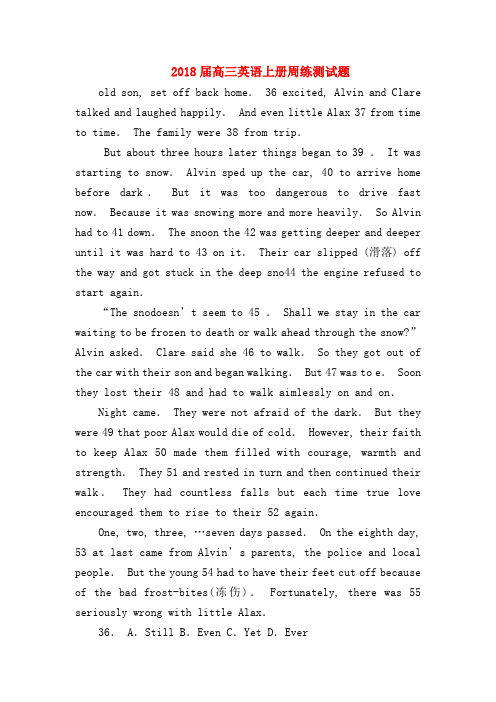
2018届高三英语上册周练测试题old son, set off back home. 36 excited, Alvin and Clare talked and laughed happily. And even little Alax 37 from time to time. The family were 38 from trip.But about three hours later things began to 39 . It was starting to snow. Alvin sped up the car, 40 to arrive home before dark.But it was too dangerous to drive fast now. Because it was snowing more and more heavily. So Alvin had to 41 down. The snoon the 42 was getting deeper and deeper until it was hard to 43 on it. Their car slipped (滑落) off the way and got stuck in the deep sno44 the engine refused to start again.“The snodoesn’t seem to 45 . Shall we stay in the car waiting to be frozen to death or walk ahead through the snow?” Alvin asked. Clare said she 46 to walk. So they got out of the car with their son and began walking. But 47 was to e. Soon they lost their 48 and had to walk aimlessly on and on.Night came. They were not afraid of the dark. But they were 49 that poor Alax would die of cold. However, their faith to keep Alax 50 made them filled with courage, warmth and strength. They 51 and rested in turn and then continued their walk.They had countless falls but each time true love encouraged them to rise to their 52 again.One, two, three, …seven days passed. On the eighth day, 53 at last came from Alvin’s parents, the police and local people. But the young 54 had to have their feet cut off because of the bad frost-bites(冻伤).Fortunately, there was 55 seriously wrong with little Alax.36. A.Still B.Even C.Yet D.Ever。
2018届高三下学期周考英语试题(一)(附答案)
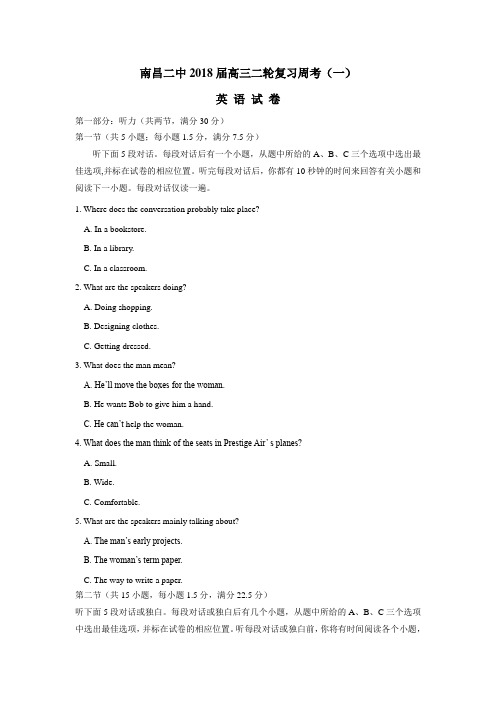
南昌二中2018届高三二轮复习周考(一)英语试卷第一部分:听力(共两节,满分30分)第一节(共5小题;每小题1.5分,满分7.5分)听下面5段对话。
每段对话后有一个小题,从题中所给的A、B、C三个选项中选出最佳选项,并标在试卷的相应位置。
听完每段对话后,你都有10秒钟的时间来回答有关小题和阅读下一小题。
每段对话仅读一遍。
1. Where does the conversation probably take place?A. In a bookstore.B. In a library.C. In a classroom.2. What are the speakers doing?A. Doing shopping.B. Designing clothes.C. Getting dressed.3. What does the man mean?A. He’ll move the boxes for the woman.B. He wants Bob to give him a hand.C. He can’t help the woman.4. What does the man think of the seats in Prestige Air’ s planes?A. Small.B. Wide.C. Comfortable.5. What are the speakers mainly talking about?A. The man’s early projects.B. The woman’s term paper.C. The way to write a paper.第二节(共15小题,每小题1.5分,满分22.5分)听下面5段对话或独白。
每段对话或独白后有几个小题,从题中所给的A、B、C三个选项中选出最佳选项,并标在试卷的相应位置。
听每段对话或独白前,你将有时间阅读各个小题,每小题5秒钟;听完后,各小题将给出5秒钟的作答时间。
【高三英语试题精选】2018高考英语第一轮复习Unit 24 Society课时训练(带答案)

You most likely will be assigned to talk about a certain topic If that’s the case, you only need to make an outline and do some research But in some cases, you will have to think of your own topic Although it gives you more freedom to do it, thinking of a topic can be tricky __2__ Or pick a topic that is timely and socially relevant
2 Make an outline for the lecture
Start by writing down the points that you will discuss, and then fill in each point with supporting ideas If necessary, make a research about your topic __3__ But if keeping doing so, you end up with a very long outline Figure hoyou can shorten the topic or cut where cutting is needed
答案break through
3.应该是孩子们睡觉的时候了。
It is high ________ that the children ________ ________ to bed
2018届高三英语周考一试卷
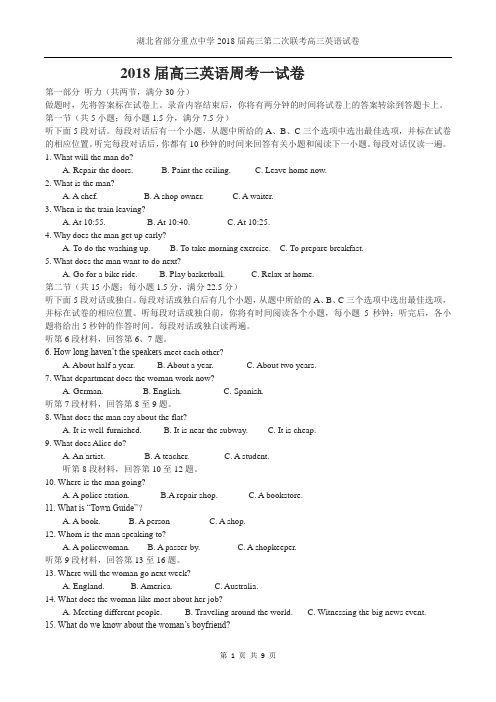
2018届高三英语周考一试卷第一部分听力(共两节,满分30分)做题时,先将答案标在试卷上。
录音内容结束后,你将有两分钟的时间将试卷上的答案转涂到答题卡上。
第一节(共5小题;每小题1.5分,满分7.5分)听下面5段对话。
每段对话后有一个小题,从题中所给的A、B、C三个选项中选出最佳选项,并标在试卷的相应位置。
听完每段对话后,你都有10秒钟的时间来回答有关小题和阅读下一小题。
每段对话仅读一遍。
1. What will the man do?A. Repair the doors.B. Paint the ceiling.C. Leave home now.2. What is the man?A. A chef.B. A shop owner.C. A waiter.3. When is the train leaving?A. At 10:55.B. At 10:40.C. At 10:25.4. Why does the man get up early?A. To do the washing up.B. To take morning exercise.C. To prepare breakfast.5. What does the man want to do next?A. Go for a bike ride.B. Play basketball.C. Relax at home.第二节(共15小题;每小题1.5分,满分22.5分)听下面5段对话或独白。
每段对话或独白后有几个小题,从题中所给的A、B、C三个选项中选出最佳选项,并标在试卷的相应位置。
听每段对话或独白前,你将有时间阅读各个小题,每小题5秒钟;听完后,各小题将给出5秒钟的作答时间。
每段对话或独白读两遍。
听第6段材料,回答第6、7题。
6. How long haven’t the speakers meet each other?A. About half a year.B. About a year.C. About two years.7. What department does the woman work now?A. German.B. English.C. Spanish.听第7段材料,回答第8至9题。
2018年高三周考
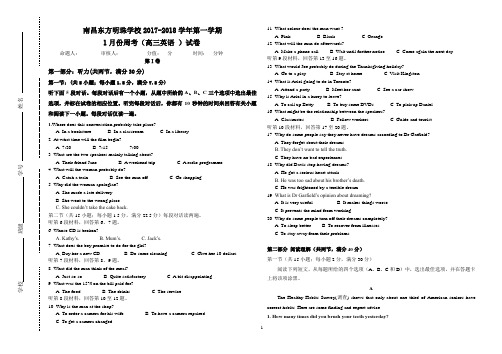
南昌东方明珠学校2017-2018学年第一学期1月份周考(高三英语)试卷命题人:审核人:分值:分时间:分钟第Ⅰ卷第一部分:听力(共两节,满分30分)第一节:(共5小题;每小题1.5分,满分7.5分)听下面5段对话。
每段对话后有一个小题,从题中所给的A、B、C三个选项中选出最佳选项,并标在试卷的相应位置。
听完每段对话后,你都有10秒钟的时间来回答有关小题和阅读下一小题。
每段对话仅读一遍。
1.Where does this conversation probably take place?A. In a bookstore.B. In a classroom.C. In a library.2.At what time will the film begin?A. 7:20.B. 7:15. 7:00.3.What are the two speakers mainly talking about?A. Their friend Jane.B. A weekend trip.C. A radio programme.4.What will the woman probably do?A. Catch a train.B. See the man off.C. Go shopping.5.Why did the woman apologize?A. She made a late delivery.B. She went to the wrong place.C. She couldn’t take the cake back.第二节(共15小题;每小题1.5分,满分22.5分)每段对话读两遍。
听第6段材料,回答第6、7题。
6.Whose CD is broken?A. Kathy’s.B. Mum’s.C. Jack’s.7.What does the boy promise to do for the girl?A, Buy her a new CD. B. Do some cleaning. C. Give her 10 dollars.听第7段材料,回答第8、9题。
2018届高三英语上学期一轮复习周测试题

2018届高三英语上学期一轮复习周测试题第一部分阅读理解(共两节,满分40分)第一节(共15小题;每小题2分,满分30分)阅读下列短文,从每题所给的四个选项(A、B、C和D)中,选出最佳选项。
AIt’s rare that you see the words “shyness” and “letter” in the sa me sentence.After all,the common viewpoint is that those out going and sociable guys make great public speakers and exc ellent networkers and that those shy people are not.A survey conducted by USA Today referred to 65 percent of executives who believed shyness to be a barrier to leadership.Interestin gly,the same article stresses that roughly 40 percent of leader s actually are quite shy—they're just better at adapting themselves to situational deman ds.Bill Gates,Warren Buffet and Charles Schwab are just a fe w "innies".Unlike their outgoing counterparts who are more sensitive to r ewards and risk-taking,shy people take a cautious approach to chance.Rather than the flashy chit-chat that defines social gathering,shy people listen attentively to what others say and absorb it before they speak.They're no t thinking about what to say while the other person is still talki ng,but rather listening so they can learn what to say.Along the same lines,shy people share a common love of learning.They are intrinsically(内在地) motivated and therefore seek content regardless of achi eving an outside standard.Being shy can also bring other benefits.Remember being in s chool and hearing the same kids contribute,until shy little Joh nny,who almost never said a word,cut in?Then what happene d? Everyone turned around to look with great respect at little J ohnny actually talking.This is how shy people made good use of their power of presence: they "own" the moment by speakin g calmly and purposefully,which translate to a positive image. Shyness is often related to modesty.Not to say that limelight-seekers aren't modest,but shy people tend to have an accurat e sense of their abilities and achievements.As a result,they ar e able to acknowledge mistakes,imperfections, knowledge ga ps and limitations.Since shy people have a lower sensitivity to outside rewards than outgoing ones,they're more comfortable working with little information and sticking to their inner desires.Shy people are also more likely to insist on finding solutions that aren't primari ly apparent.Don't believe me?Maybe you'll believe Albert Eins tein,who once said,"It's not that I'm so smart,it's that I stay wit h problems longer."Obviously,finding certainty where uncertai nty is typically popular is a huge plus for any successful perso n.The myth that shy people are less effective leaders than their outgoing fellows is just a misunderstanding.Make wise use of your personality strengths to lead your business no matter wh at side of the range you fall on.1.We can learn from Paragraph 2 that_______.A.shy people are sensitive to rewardsB.shy people care more about contentC.outgoing people are more careful about chances D .outgoing people consider what to learn while listening2.The example of Johnny shows______.A.shy people are likely to be modestB. hardworking students speak little in publicC.some students keep silent on purpose at schoolD. shy people may have an advantage in discussion3.We can learn from the underlined sentence in Paragraph 5 t hat______.A.shyness results in successB.sh yness contributes to popularityC.outside reward leads to insistenceD. uncertainty counts more than certainty4.The author supports his ideas mainly by______.A.giving definitions and presenting research resultsB.explaining problems and providing solutionsC.quoting authorities and making evaluationsD. making contrasts and gibing examplesB“Can’t hold a candle to” is a popular expression.When there w asn’t electricity,someone would have a servant light his way b y holding a candle.The expression meant that the person who cannot hold a candle to you is not fit even to be your servant. Now,it means such a person cannot compare or compete. Another expression is “hold your tongue.”It means to be still a nd not talk.“Hold your tongue”is not something you would tell a friend.But a parent or teacher might use the expression to q uiet a noisy child.“Hold out”is an expression one hears often in sports reports and labor news.It means to refuse to play or work. Professional football and baseball players “hold out” if their team refuses t o pay them what they think they are worth.The expression “hold up” has several different meanings.One is a robbery.A man with a gun may say,“This is a hold up.Give me your money.”Another meaning is to delay.A driver who w as held up by heavy traffic might be late for work.Another mea ning is for a story to be considered true after an investigation.A story can hold up if it is proved true.“Hold on” is another expression,which means wait or stop.As you leave for school,your brother may say,“Hold on,you forgot your book.” It is used to ask a telephone caller to wait and not hang up his telephone.Our final expression is “hold the line.”That means to keep a pr oblem or situation from getting worse—to hold steady.For example,the president may say he will “hol d the line on taxes.”He means there will be no increase in tax es.5.The expression “can’t hold a candle to” can be used when _ ______.A.some footballers refuse to play a gameB.som eone else is wanted on the phoneC.someone is not qualified for a positionD.someone was delayed by heavy traffic6.The tune of the phrase “hold your tongue” is probably a little _______.A.amusingB.politeC.unfriendlyD.offensive7.If some teachers “hold out”,they probably______.A.change their attitudeB.refuse to workC.make a compromiseD.show their devotion8.Which of the following sentences can convey positive meani ngs?A.I was late as I was held up by a hold up.B.Hol d on!You have to pay the bill,sir.C.You can’t even hold a candle to Michael.D.I promise to hold the line on house prices.CHow can we reduce the risk?There are four general approaches to dealing with volcanic (火山似的)dangers.We can try to keep the danger from occurring—often an impossible task.We can try to change its path or redu ce its impact on existing development. We can take steps to p rotect future development.We can also do our best to have disaster response plans in place before they are needed. Removing the ThreatClearly,there is no way to stop an eruption.We can,however,a ttempt to reduce the eruption’s effects by strengthening struct ures,for example,building protective works such as walls to m ake lava(熔岩)flow away from developed areas.Such efforts can be and hav e been successful,but are of limited use in a large-scale(范围)eruption.Planning for the FutureProtecting future development from volcanic dangers is a sim ple task.Before building houses,we should judge the risk.If the risk seems too great,a safer location should be found.This ty pe of planning is very effective,but all too often,people are dra wn to the lush(葱郁的),rolling land of a quiet volcano. Disaster Preparedness(预案)When a volcano comes to life,a few weeks may not be enoug h to avoid a tragedy.Planning is the key to saving lives.Well b efore the warning signs occur,people must be educated about volcanic dangers.Escape plans must be in munica tion between scientists,officials,the media,and the general pu blic should be practiced.Emergency measures must be thoug ht out and agreed upon.If you doubt the importance of these efforts,take another look at past volcanic tragedies,such as the eruption of Nevado del munication failures left the town of Armero unprepar ed for escape.When a deadly mudflow came down the slope (斜坡),21,000 people—90 percent of the town’s people—died.9.The passage is intended for_______.A.the general publicB.architectsC.adventurersD.geographers10.When building houses,people tend to______.A.judge volcanic dangers carefullyB.take volcanic dangers seriouslyC.live near a quiet volcanoD.find a safer place far away from a volcano11.The writer mentioned Nevado del Ruiz to prove______.A.the failure to keep volcanic dangers from happeningB.the importance of preparing for a volcanic eruptionC.the bravery of the people in Armero TownD.the uncertainty of volcano’s damageDI was born and raised in Minnesota,the USA,but us an adult I have mostly lived in Europe and Africa.I teach cross-cultural management at the International Business School ne ar Paris.For the last 15 years,I’ve studied how people in differ ent parts of the world build trust,communicate,and make decis ions especially in the workplace.While traveling in Tokyo recently with Japanese colleague,I g ave a short talk to a group of 20 managers.At the end,I asked whether there were any questions or comments.No hands we nt up,so I went to sit down.My colleague whispered to me,“I th ink there actually were some comments,Erin.Do you mind if I t ry?”I agreed,but I guessed it a waste of breath.He asked the g roup again,“Any comments or questions?”Still,no one raised a hand,but this time he looked very carefull y at each person in the silent audience.Gesturing to one of th em,he said,“Do you have something to add?”To my amazeme nt,she responded “Yes,thank you.” and asked me a very inter esting question.My colleague repeated this several times,looki ng directly at the audience and asking for more questions or c omments.After the session,I asked my colleague,“How do you know tha t those people had questions?”He hesitated,not sure how to e xplain it,and then said,“It has to do with how bright their eyes are.”He continued,“In Japan,we don’t make as much direct eye contact as you do in the West.So when you asked if there were any comments,most people were not looking directly at you.B ut a few people in the group were looking right at you,and thei r eyes were bright.That indicates that they would be happy to have you call on them.”I thought to myself I would never have learned from my upbrin ging in Minnesota.Since then,I try to focus on understanding b ehavior in other cultures I encounter,and keep finding the brig ht eyes in the room.12.What can we conclude from the first paragraph?A.Life in Minnesota has made the author worn out. B .The author enjoys traveling around the world.C.Different cultures are kind of familiar to the author.D.The author may start his own business in the future.13.Hearing the colleague whispering,the author______.A.went back to his seat and got seatedB.knew his colleague had some questionsC.owed a big debt of gratitude to his colleagueD.thought his colleague would get nowhere14.Where does the author’s colleague probably come from?A.Japan.B.America.C.Africa.D.France15.Which is the proper title for the passage?A.Focusing on Behavior in Cultures.B. Looking at Another Culture in the Eye.C.Sharing Different Cultures in Tokyo.D.Admiring the Beauty in the Eye.第二节(共5小题;每小题2分,满分10分)根据短文内容,从短文后的选项中选出能填入空白处的最佳选项。
湖南省郴州市第一中学2018届高三第五次英语周练试题含答案

第I卷Designer:Mr. Liao 第二部分:阅读理解(共两节,40分)第一节(共15小题;每小题2分,共30分)阅读下列短文,从每题所给的四个选项(A、B、C和D)中,选出最佳选项。
A1。
iD Programming Academy for Teens iPhone App Creation, Robotics &More!Academic Camp: Computer,Computer Gaming,Computer ProgrammingCamp Address:Held at Stanford, UCLA, PrincetonPhone: (888)709-TECH (8324)Love programming and robotics?Spend 2 weeks with other teens who share your interests。
Interact(互动)with industry professionals and discover future careers。
iPhone,iPad&Android App Development, Robotics Engineering and Coding, Programming with Minecraft,Java。
2。
Julian Krinsky School of Tennis&GolfSports Camp: Fitness,Golf, Sports Performance,TennisCamp Address:800 E。
Lancaster Ave。
Villanova, Pennsylvania Phone: (610) 265—9401Powered by head(顶级的)Tennis, our Tennis camp takes you to thenext level through daily instruction, personalized coaching,match play and mental and physical conditioning。
高三英语上学期周考试题(1.24)-人教版高三全册英语试题
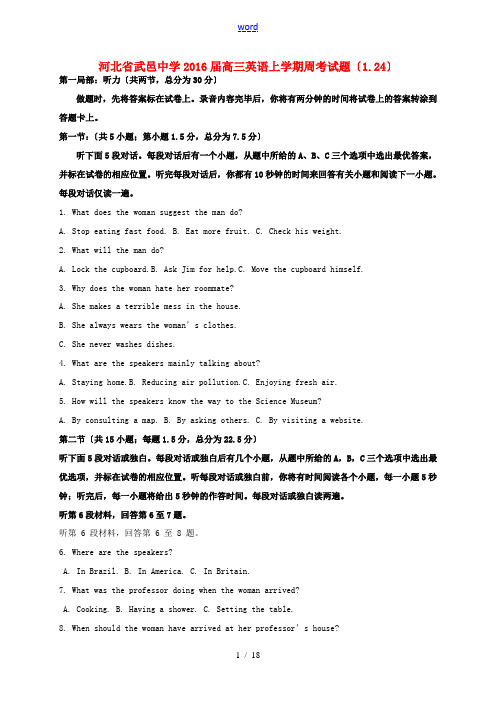
河北省武邑中学2016届高三英语上学期周考试题〔1.24〕第一局部:听力〔共两节,总分为30分〕做题时,先将答案标在试卷上。
录音内容完毕后,你将有两分钟的时间将试卷上的答案转涂到答题卡上。
第一节:〔共5小题;第小题1.5分,总分为7.5分〕听下面5段对话。
每段对话后有一个小题,从题中所给的A、B、C三个选项中选出最优答案,并标在试卷的相应位置。
听完每段对话后,你都有10秒钟的时间来回答有关小题和阅读下一小题。
每段对话仅读一遍。
1. What does the woman suggest the man do?A. Stop eating fast food.B. Eat more fruit.C. Check his weight.2. What will the man do?A. Lock the cupboard.B. Ask Jim for help.C. Move the cupboard himself.3. Why does the woman hate her roommate?A. She makes a terrible mess in the house.B. She always wears the woman’s clothes.C. She never washes dishes.4. What are the speakers mainly talking about?A. Staying home.B. Reducing air pollution.C. Enjoying fresh air.5. How will the speakers know the way to the Science Museum?A. By consulting a map.B. By asking others.C. By visiting a website.第二节〔共15小题;每题1.5分,总分为22.5分〕听下面5段对话或独白。
- 1、下载文档前请自行甄别文档内容的完整性,平台不提供额外的编辑、内容补充、找答案等附加服务。
- 2、"仅部分预览"的文档,不可在线预览部分如存在完整性等问题,可反馈申请退款(可完整预览的文档不适用该条件!)。
- 3、如文档侵犯您的权益,请联系客服反馈,我们会尽快为您处理(人工客服工作时间:9:00-18:30)。
高三英语周练试卷2018.1.24AWhen I was a boy there were no smart phones, and our television only got one channel clearly. Still, I never felt bored. The fields, hills and woodlands around my home were the perfect playground whose adventures were only limited by my imagination. I can remember once hiking to a nearby lake and walking slowly around it. At the back of it I was amazed to find an old dirt road that I had never seen before. It was full of muddy tyre tracks and deep woods bordered it on both sides, but exploring it still seemed like a fine adventure.I walked on and on for what seemed like hours. I was sure my guardian angel was whispering in my ear “turn around and head back home”, but I was stubborn and walked on. There was still neither a car nor a house in sight. I noticed that the sun was starting to go down and I grew scared. I didn’t want to end up trapped on this road, and I was worried that it would be dark before I could make my way back to the lake again.I continued to walk on with something growing inside of me. My heart was pounding and my legs were aching. I was almost in tears when I saw something in the distance. It was a house that I recognized.I jumped up and down and laughed out loud. It was still over a mile away, but my legs felt like feathers and I hurried back to my house in no time. I walked in with a big smile on my face just in time for dinner. Then I ended my adventure with a good night’s sleep.I often thought of that experience recently. Actually, in our life, all roads, no matter how they twist and turn, can lead us home again. They can lead us to our homes here on the earth. They can lead us to our homes in our hearts. May you always walk your path with love! May you always help your fellow travelers along the way! And may your roads always lead you home again !21. Why did the author hardly feel bored when he was young?A. He could watch TV all day.B. He could have fun in nature.C. He had many friends to play with.D. He used to explore the old dirt road.22. What does the underlined word “something” in Paragraph 3 probably refer to?A. Doubt.B. Hope.C. Fear.D. Courage.23. How did the author feel when he was exploring the dirt road?A. He was contradictory in mind.B. He was unconscious of danger ahead.C. He was worried to be trapped in the woods.D. He was afraid of being scolded by his parents.24. What may be the best title for the passage?A. Every Effort Is WorthwhileB. All Roads Lead HomeC. Be Determined in Your LifeD. Be Brave to AdventureBA day in the life of 18-year-old David Lanster is full of typical teenage stuff: school, baseball practice and homewo rk. And then he starts cooking. “Some nights I’m up until 1:00 a.m. making pies, or even later if we’re cooking beef,” said the student at Ransom Everglades High School in Florida, US.For the past year, Lanster and Kelly Moran, his classmate, have been hosting fancy dinner parties at Lanster’s parents’ home. Their meals have 17 courses and are all made by them. Their guests used to give them gifts to thank them until the pair decided to do something nice for charity(慈善).“We got some really great Miami Heat tickets, a nice watch, and many kitchen gadgets(小器具),” Lanster said. “But we wanted to make this something positive for people other than US.”Lanster and Moran focused on Common Threads, a charity that aims to teach kids in poor communities to cook and make healthy eating choices. The young cooks ask their guests to give however much they want as payment for their meals. It all goes to Common Threads because Lanster’s parents cover their food costs. After their last 12-person event, Lanster and Moran gave $1,600 to the charity.Now, they’re taking their show out of the kitchen and on the road. They have started to organize private dinner parties with a similar model: the host pays for the ingredients, and the guests make a donation to a charity of their choice.Without formal training, Lanster said he had been interested in cooking since he helped his mom in the kitchen when he was very young. He learned how to cook by reading cookbooks and watching TV programs. Outside the kitchen, the two are busy preparing their college applications. Neither of them is sure what they will do in the future, but they’ve promised their parents that they will leave professional cooking alone until they finish school.25. How is Lanste r’s life different from other teenagers’ lives?A. He plans to become a professional chef.B. He plays baseball every day after school.C. He goes to a cooking school in his spare time.D. He holds dinner parties after a normal school day.26. What will Lanster and Moran usually do after a private dinner party?A. Receive thank-you cards from the guests.B. Visit the poor children at Common Threads.C. Ask the guests to donate money to the charity.D. Cover the food costs with the money collected.27. Which of the following words can best describe Lanster and Moran?A. Ambitious.B. Generous.C. Creative.D. Optimistic.CThe hit movie Notting Hill(诺丁山)begins with a famous scene. Hugh Grant bumps into Julia Roberts and spills orange juice all over her. After the collision, Grant repeatedly says, “I’m so sorry. I’m so sorry.”His actions in this scene are very British. If Roberts’ character were from Britain, then she would probably apologize repeatedly as well —even if the crash were not her fault. But this doesn’t happen in the movie, as Roberts is from the US.A report in The Telegraph once said that three quarters of British people apologize when they bump into someone in the street — regard less of whether they are responsible or not. In fact, Britons use “sorry” in many situations. For example, if they mishear someone, they say “Sorry?” The person they are talking to will also apologize by replying, “No, I am sorry!” This can go on for up to five minutes as they compete over who is the most sorry.Why are Britons so sorry? Mark Tyrell, a psychology writer in the UK, thinks that their apologetic tendencies are rooted in British class system. “We say sorry because historically the new middle cl ass in Britain had to apologize for not being the working class, but also for not really being the upper class.” Another theory is that they apologize to avoid conflicts. For example, if they bump into someone, he might get angry. To avoid this, they insta ntly say “Sorry!”True manners are about being considerate, and today’s constant use of apologizing shows that we are perhaps not as thoughtful as we once were. The word “sorry” has lost some of its meaning. Do you see my point? Sorry, it might just be a British thing.28. Why does the author mention a scene in the movie Notting Hill at the beginning?A. To give an example of British modesty.B. To introduce different ways of saying sorry.C. To show what kind of men are considered gentlemen in the UK.D. To draw our attention to when and how British people say sorry.29. Which of the following statements might Mark Tyrell agree with?A. People should not apologize if they are not responsible.B. Americans care less about manners than British people do.C. That British people apologize so much is linked to the class system.D. British people care too much about which social class they are from.30. What can be inferred from the passage?A. It’s unnecessary for British people to be so polite.B. The overuse of apologizing shows Britons are truly sincere.C. People should not stick to the traditional use of the word “sorry”.D. Using “sorry” more doesn’t necessarily mean peo ple are more polite.31. What is the author’s purpose in writing this passage?A. To explore the best way of saying sorry.B. To explain why Britons overuse the word “sorry”.C. To show how saying sorry has changed over time.D. To suggest many British people lack traditional manners.DImagine you’re standing in line to buy a snack at a store. You step up to the counter and the cashier scans your food. Next, you have to pay. But instead of scanning a QR Code(二维码)with your smart phone, you just hold out your hand so the cashier can scan your fingerprint. Or, a camera scans your face, your eyes or even your ear.Now, this type of technology might not be far away. As technology companies move away from the traditional password, biometric(生物特征识别的)security, which includes fingerprint, face and voice ID, is becoming increasingly popular.In 2013, Apple introduced the iPhone 5s, one of the first smart phones with a fingerprint scanner. Since then, using one’s fin gerprint to unlock a phone and make mobile payments has become commonplace, bringing convenience to our lives. And since 2016, Samsung has featured eye-scanning technology in its top smart phones, while Apple’s new iPhone X can even scan a user’s face. But despite its popularity, experts warn that biometrics might not be as secure as we imagine. “Biometrics is ideally good in practice, not so much,” said John Michener, a biometrics expert.When introducing the new iPhone’s face ID feature, Phil Schiller, Apple’s senior vice-president, said, “The chance that a random person in the population could look at your iPhone X and unlock it with their face is about one in a million.” But it’s already been done. In a video posted on a community website Reddit, two brothers showed how they were each able to unlock the same iPhone X using their own face. And they aren’t even twins.“We may expect too much from biometrics,” Anil Jain, a computer science professor at Michigan State University, told CBS News. “No security systems are perfect.”Earlier last year, Jain found a way to trick biometric security. Using a printed copy of a thumbprint, she was able to unlock a dead person’s smart phone for the police, according to a tech website Splinter. “It’s good to see biometrics being used more,” Jain told CBS News, “because it adds another factor for security. But using multiple security measures is the best defense.”32. Which is the latest identification technology in a smart phone according to the passage?A. Face scanning.B. Eye scanning.C. QR Code scanning.D. Fingerprint scanning.33. What is a major problem of the iPhone X’s face ID system?A. It takes too long to unlock the phone.B. It often fails to rec ognize its owner’s face.C. Face data can be used for other purposes.D. Different faces can be used to unlock the same phone.34. What is Anil Jain’s opinion about biometric security?A. It is as secure as traditional measures.B. It is perfect without much improvement.C. It has caused much trouble for the police.D. It should be used with other security measures.35. What does the author intend to tell us in this passage?A. The popularity of biometrics.B. Security problems of biometrics.C. Various problems with biometrics.D. Great changes caused by biometrics.第二节(共5小题;每小题2分,满分10分)根据短文内容,从短文后的选项中选出能填入空白处的最佳选项,并在答题卡上将该项涂黑。
